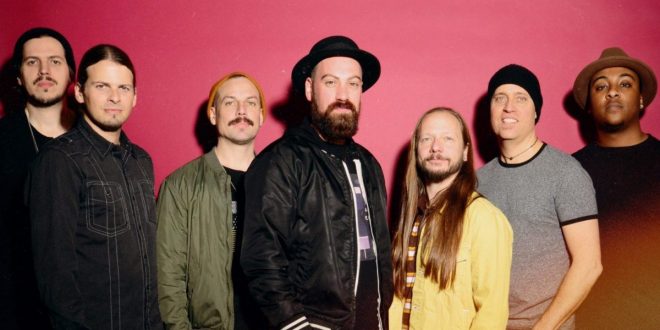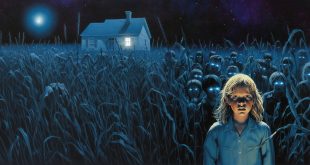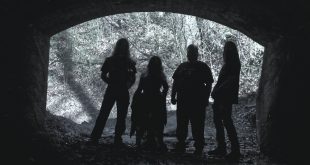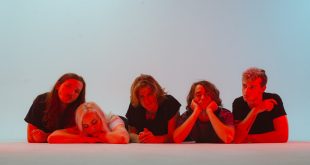Since 1998, Colorado’s The Motet has maintained their signature foundation of 70s-inspired jazz grooves with accents of punchy funk. The Denver-based septet strove through numerous incarnations, finding stability in 2016 by welcoming vocalist Lyle Divinsky and sax player Drew Sayers into the fold. This expansion proved noteworthy, as it was eventually complemented by a second sold-out show at the legendary Red Rocks Amphitheatre. Three years later, the band would release their ninth and latest album, Death Or Devotion, which marks their debut with this lineup.
On May 23, The Motet is set for an upcoming show in Jersey City, New Jersey at the White Eagle Hall. I had the pleasure of speaking with guitarist Ryan Jalbert (who joined in 2005) to discuss playing live, his formative days, the band’s newfound chemistry, as well as what he can glean from the making of Death Or Devotion.
ME: In general, how have you liked playing live these days?
Ryan: I love it! It’s my bread and butter and my favorite thing to do, really. We also love the studio process and writing, but live performance is where we have the most fun.
ME: Taking it back a bit, what initially inspired your musicianship as a kid?
Ryan: My dad had a great record collection back then. He was into a lot of classic rock from the 60s and 70s, but he was also really into the blues. Listening to that type of music, something about it just hit me, growing up in…suburban Massachusetts (laughs)! That’s so far away from where it all happened, you know? I don’t know what drew me to that; maybe just the depth of the music, and that I could hear the influence that those musicians had on my favorite guitarists at the time.
As I was learning guitar, I loved Jimi Hendrix, Eric Clapton, and all those guys from that era. Then, I was naturally inclined to see what their influences were: The three Kings – BB, Howard and Freddie, Robert Johnson, Howlin’ Wolf, and those guys. That was my early inspiration. I went from the blues, to the east coast jam band scene of the 90s, to just straight up jazz. From there, I dove headfirst into the jazz world, and I went to school for jazz.
ME: Nice!
Ryan: Yeah, it was a very organic process that got me there. Through jazz, and after college, I got more into funk – real funk, you know?
ME: Yup. How did that combination of influences eventually translate into The Motet?
Ryan: Right around 2000, I was fully into jazz and playing a lot of gigs. As I mentioned, there was a great northeast jam scene at that time. I noticed that, while traveling around and doing these shows, The Motet would come to town. I would catch them occasionally, and Garrett Sayers, the bassist, was originally playing in the band Miracle Orchestra, who I’d also see a lot. I got to know Garrett from those times, then once he left that band, he moved to Colorado a few years before I did and started touring with those guys.
When I finally got out there later in 2004, I linked up with Garrett. By that time, The Motet was doing these weekly gigs at a little club called Motet Playground. Each member would bring in a tune and try to chart it out live to see what works, which is a cool way to do it. They were looking for a guitarist, so I just went down there and sat in during the new tunes they were working on, and they liked the way I played.
With all of us coming from a jazz background, it just makes you totally adaptable. When you play jazz, you have to understand harmony, rhythm, and timing. It’s a complex form of music, but once you have that foundation, you’ll be ready for anything. So, once I’d played with the band, that was early 2005, and we’ve been on the road, playing shows, and traveling ever since.
ME: Your lineup changed a bit over the past few years. Has your chemistry improved since then?
Ryan: It’s honestly better than ever! And the thing to note is that there have been many changes throughout the entirety of the band. But I could see that, by 2016, we’ve reached a bit of a higher profile. It’s funny, because at the time, this change was a stressful situation, but it always seemed to work itself out. And not only did it work itself out; the band just gets better. Anything that’s thrown at us, we work out, and then that becomes a strength. Our last vocalist, Jans Ingber, was ready to get off the road and had a family. He was in Portland, we were in Denver, and we were just like “Cool!” you know? Then, we eventually found Lyle, and we were like, “Oh my God, we can’t believe how good this guy is!” We had just met, and he was that good and didn’t know it.
Originally, we found out about Lyle through some good buddies of ours in the band Lettuce. Lyle already had albums out at the time. When we met him, he was just about to release his next solo record, which is amazing. It has all these awesome guest musicians on it, and was going to be a big release for him, and we just scooped him up out of that and took him on the road with us. In fact, there’s still all this merch from the tour for his solo album that never happened (laughs)! So, we put him on the road, put him in the studio, and have hit the ground running. Garrett’s brother, Drew, had also joined around this time.
After that, Gabe Mervine, the trumpet player, said that touring was wearing him down as well, and that’s totally understandable, so he left last year. We’ve since found Parris Fleming, and we’ve known him from our time in Chicago; he was in a band, The Heard, that we really liked, and we brought him in last year. Honestly, this is our strongest lineup to date.
ME: With your newfound chemistry, how has that factored into the writing of Death Or Devotion?
Ryan: It’s definitely made the process a lot more cohesive. With fresh energy, this creates a positive rapport, and a genuinely good vibe within the band, so the writing was a lot of fun. We did this thing where each of us would do the writing at our home studios, email each other the tracks, then come into the main studio and lay them down. Dave Watts would record all of our rehearsals, and then send back the tracks before the next rehearsal, then we decide if we need to make changes, and then continue to refine the rhythm section. Once we’d find a form that works, we send it to Lyle, then Lyle would write lyrics, send it back to the rhythm section, then send it to the horns, and then the horn section would write stuff. Then when that’s done, we just make little tweaks here and there, and then we record in the main studio. It’s more or less an assembly line, and that’s worked out for us.
ME: When it comes to the actual recording process in the studio, what goes down?
Ryan: We do the rhythms as the foundation, then myself, Garrett, Joey [Porter], and Dave lay the tunes down. Usually, we have Lyle there singing with us, and we layer the horns on after the fact. We just want to get great takes. Everyone always talks about this, but it really doesn’t make much more of a difference after the fifth take (laughs). The sweet sound is usually around the second or third take. Basically, if the form is working, that’s where you’re going to get something good. We just get in there, play the tunes, pick the takes that we like, and try maybe minimal editing. Then Lyle would come in — kind of in the same order as we’re writing — and record his vocals on our takes, and then we layer in the horns, and we basically have the song how we want it. Then, we’ll go in and do extra overdubs. A lot of the time, Joey’s playing clarinet, and we’ll add organ after the fact, or maybe a Fender Rhodes piano, or a synth solo, and just have fun with it.
ME: The album starts on “Highly Compatible.” At what point did you get to choose that song as an opener?
Ryan: This time around, I was actually happy to be removed from the song order process (laughs). But in general, it had to do with creating an arc, and having variations in tempo and keys. You wouldn’t want to have three songs in the same key, so pretty much every song is in a different key, I believe. So, we started with “Highly Compatible” because it has that cool intro and is a little bit ominous. Then, we give the listener some breathers, which are more passive listens, and then pump it back up.
ME: I noticed each track gets slightly more involved as the album progresses. It’s a subtle element which you guys implement very well.
Ryan: Thanks man, I appreciate it!
ME: The middle vibe of the album is defined by the title track, and “That Dream.” What happened by that point?
Ryan: What we did this time around was release singles in the order that we recorded them. The first single we released was “Supernova,” then we’d just go on to the next one. We started adapting the newer music consumption model, where it’s better to keep fans focused on singles for the time being, rather than just dropping a full album. We were just touring so hard that our schedule was crazy, but we still had time to release some music in the meantime. “Supernova” actually came out a year before the album. Then, we released “Get It Right” and “That Dream,” and at the same time, we’d be working on seven or eight tracks for the album.
For the middle part of the album, particularly “Death Or Devotion”, that tune initially came out so wrong in the beginning, and I think it was actually the last song that we recorded. It’s interesting now how the album feels so cohesive. When I listen back to it, it has an organic direction and feels all connected.
ME: Overall, what did you guys take away from the whole experience?
Ryan: Speaking for myself, I can say that I’m always learning how to write better, and get more involved in the recording process. When it comes to playing live, like we first started talking about, we play live so much, and that’s my comfort zone. Writing for this band has been challenging. It’s really all about keeping each individual in mind when I’m in my home studio, coming up with ideas to bring in. When it comes to Joey and Garrett, for instance, I have the keys and bass in mind first before writing a guitar part. That’s been the best way to do it. In the studio, there’s always stuff to be learned in terms of production, and getting the right tones. It all comes down to your mindset when entering the studio, and just learning to focus on playing, and maybe even simplifying — just getting a solid take with emotion, a pocket, and feel. Nothing has to be too fancy; it just has to be real. And then that will come across.
ME: Lastly, anything you’d like to say to your fans?
Ryan: We finally have a little break in our touring schedule in a couple weeks, so May will be festival season. We’ll hop around doing weekend festivals, but during the week, we’re writing for the next record. Keep an eye on the calendar, and stay tuned for more music!
The Motet Socials:
Official Website|Facebook|Twitter|Instagram|SoundCloud|YouTube
 Music Existence Because of Music, We Exist
Music Existence Because of Music, We Exist




